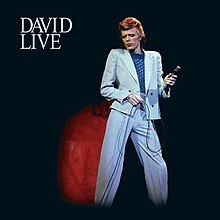
Reality is the 24th studio album by the English musician David Bowie, originally released in Europe on 15 September 2003, and the following day in America. His second release through his own ISO label, the album was recorded between January and May 2003 at Looking Glass Studios in New York City, with production by Bowie and longtime collaborator Tony Visconti. Most of the musicians consisted of his then-touring band. Bowie envisioned the album as a set of songs that could be played live.

Diamond Dogs is the eighth studio album by the English musician David Bowie, released on 24 May 1974 through RCA Records. Bowie produced the album and recorded it in early 1974 in London and the Netherlands, following the disbanding of his backing band the Spiders from Mars and the departure of producer Ken Scott. Bowie played lead guitar on the record in the absence of Mick Ronson. Diamond Dogs featured the return of Tony Visconti, who had not worked with Bowie for four years; the two would collaborate for the rest of the decade. Musically, it was Bowie's final album in the glam rock genre, though some songs were influenced by funk and soul music, which Bowie embraced on his next album, Young Americans (1975).

The Man Who Sold the World is the third studio album by the English musician David Bowie, originally released through Mercury Records in the United States on 4 November 1970 and in the United Kingdom on 10 April 1971. Produced by Tony Visconti and recorded in London from April to May 1970, the album features the first appearances on a Bowie record of future Spiders from Mars members Mick Ronson and Mick Woodmansey.
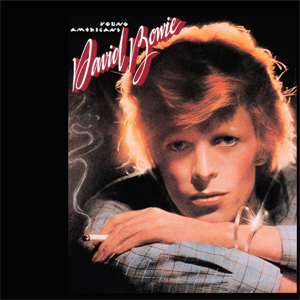
Young Americans is the ninth studio album by the English musician David Bowie, released on 7 March 1975 through RCA Records. A departure from the glam rock style of previous albums, the record showcased Bowie's interest in soul and R&B. Music critics have described the sound as blue-eyed soul; Bowie himself labelled the album's sound "plastic soul".

"Heroes" is the twelfth studio album by the English musician David Bowie, released on 14 October 1977 through RCA Records. Recorded in collaboration with the musician Brian Eno and the producer Tony Visconti, it was the second release of his Berlin Trilogy, following Low, released in January the same year, and the only one wholly recorded in Berlin. Sessions took place in mid-1977 after Bowie completed work on Iggy Pop's second solo album Lust for Life. Much of the same personnel from Low returned for "Heroes", augmented by the King Crimson guitarist Robert Fripp.

Lodger is the thirteenth studio album by the English musician David Bowie, released on 25 May 1979 through RCA Records. Recorded in collaboration with the musician Brian Eno and the producer Tony Visconti, it was the final release of his Berlin Trilogy, following Low and "Heroes". Sessions took place in Switzerland in September 1978 during a break in the Isolar II world tour, and in New York City in March 1979 at the tour's end. Most of the same personnel from prior releases returned, and the future King Crimson guitarist Adrian Belew joined from the tour. The sessions saw the use of techniques inspired by Eno's Oblique Strategies cards, such as having the musicians swap instruments and playing old songs backwards.
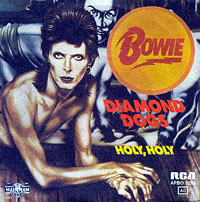
"Diamond Dogs" is a 1974 single by English singer-songwriter David Bowie, the title track of the album of the same name.
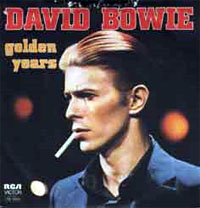
"Golden Years" is a song by the English musician David Bowie, released by RCA Records on 21 November 1975 as the lead single from his tenth studio album Station to Station (1976). Partially written before Bowie began shooting for the film The Man Who Fell to Earth (1976), the song was mostly compiled in the studio and was the first track completed for the album. Co-produced by Bowie and Harry Maslin, recording took place at Cherokee Studios in Los Angeles during September 1975. Due to Bowie's heavy cocaine use, he later recalled remembering almost nothing of Station to Station's production.
"Joe the Lion" is a song by David Bowie in 1977 for the album "Heroes". It was produced by Bowie and Tony Visconti and features lead guitar by Robert Fripp.
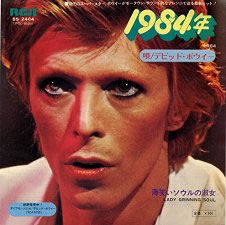
"1984" is a song by the English musician David Bowie, from his 1974 album Diamond Dogs, released as a single in the United States and Japan. Written in 1973, it was inspired by George Orwell's Nineteen Eighty-Four and, like much of its parent album, originally intended for a stage musical based on the novel, which was never produced because permission was refused by Orwell's widow Sonia.

Stage is the second live album by the English musician David Bowie, recorded on the Isolar II Tour, and released through RCA Records in 1978. Stage has been reissued numerous times, each with expanded track listings.
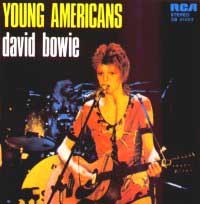
"Young Americans" is a song by the English singer-songwriter David Bowie from his ninth studio album of the same name. It was mostly recorded in August 1974 at Sigma Sound Studios in Philadelphia and was debuted on the Soul tour the following month. The song featured contributions from then-unknown singer Luther Vandross, who conceived the backing vocal arrangement. An embracement of R&B and Philadelphia soul, the song presents an Englishman's impressionist portrait of America at the time, featuring various characters and allusions to American totems and events.

"John, I'm Only Dancing" is a song by the English musician David Bowie, originally released as a non-album single on 1 September 1972. A glam rock and R&B number, the lyrics describe a situation in which the narrator informs his lover not to worry about the girl he is with because he is "only dancing" with her. Although ambiguous, many interpreted it as concerning a gay relationship. Recorded in London in June 1972, it was boosted by a low-budget promotional video directed by Mick Rock. It reached number 12 in the UK; RCA refused to release it in America due to its suggestive lyrical content.
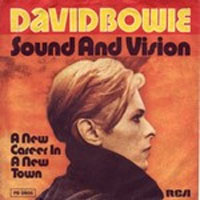
"Sound and Vision" is a song by the English musician David Bowie. It was released in January 1977 by RCA Records on side one of his 11th studio album Low. RCA later chose it as the first single from the album. Co-produced by Bowie and Tony Visconti, the song was recorded at the Château d'Hérouville in Hérouville, France, in September 1976, and completed at Hansa Studios in West Berlin in October and November. The song began as a simple G major chord progression that Bowie gave to the backing musicians, writing and recording his vocals afterward. It features backing vocals from Brian Eno and Visconti's then-wife Mary Hopkin.
"Panic in Detroit" is a song written by the English singer-songwriter David Bowie for the album Aladdin Sane in 1973. Bowie based it on his friend Iggy Pop's descriptions of revolutionaries he had known in Michigan and Pop's experiences during the 1967 Detroit riots. Rolling Stone magazine called the track "a paranoid descendant of the Motor City's earlier masterpiece, Martha and the Vandellas' "Nowhere to Run"".

"Rock 'n' Roll with Me" is a power ballad written by David Bowie and Geoff MacCormack and recorded in January 1974 that first appeared on Bowie's Diamond Dogs album, supposedly to address the artist's complex relation with his fans. A version recorded during the Diamond Dogs tour in July 1974 was released on the album David Live.
"Big Brother" is a song written by David Bowie in 1973 and intended for his never-produced musical based on George Orwell's Nineteen Eighty-Four. In 1974 it was released on the album Diamond Dogs. It segued into the final track on the record, "Chant of the Ever Circling Skeletal Family".

"Can You Hear Me?" is a ballad by the English musician David Bowie from his 1975 album Young Americans. Bowie called it a "real love song", written with someone in mind, but he did not identify them. The song was released as a single in November 1975 on the B side of "Golden Years".

"Stay" is a song by the English musician David Bowie, released on his 1976 album Station to Station. The song was recorded in late 1975 at Cherokee Studios in Los Angeles. Co-produced by Bowie and Harry Maslin, the recording featured guitarists Carlos Alomar and Earl Slick, bassist George Murray, drummer Dennis Davis, pianist Roy Bittan and Warren Peace on percussion. The track features prominent dual guitar work from Slick and Alomar, who mostly composed it in the studio. Based on the chord structure of "John, I'm Only Dancing (Again)", a funk reworking of "John, I'm Only Dancing" (1972), "Stay" emulates funk rock, soul and hard rock. The song's lyrics are abstract and relate to love.

I'm Only Dancing is a live album by the English musician David Bowie. It had a limited release on 29 August 2020 for Record Store Day as a double LP and double CD. It was recorded on the second half of the Diamond Dogs Tour in 1974, which is known as "the Soul Tour" due to the influence of the then-unreleased material Bowie had begun recording for Young Americans (1975). I'm Only Dancing marks the first time performances from this portion of the tour have been officially released.
